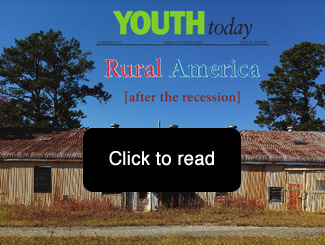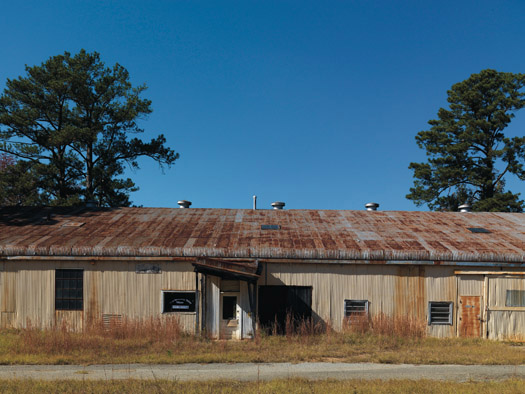
Photo by Jan Banning
A lot seems to have changed over the last four years. At first, things, momentarily, appear a lot better than I thought they would. The subdivisions which buffer my folks’ neck of the woods on all sides – left and right, in front of and behind – seem to be filled with people, perhaps frugal transplants who eyed some available real estate and snatched up property at reduced prices. There is a lot of green en route to Griffin Road, from rolling pastures to the leafy tops of trees that somehow managed to survive a tornado outbreak about a year earlier. The bucolic countryside, with its almost incandescent green fields and an array of knotted and twisted oaks in the background, reminds me less of northwest Georgia and more of the landscape described by Tolkien in “The Lord of the Rings.” In some ways, I felt like Frodo Baggins returning to the Shire – after a long journey, for better and for worse, I was finally home.
After awhile, however, I notice perhaps a bit too much green dotting the landscape. The weeds had grown ridiculously tall, standing four or five feet high. A makeshift memorial, built for a kid who died in a car wreck on my home road several years ago, once loomed over the hillside. Now, I can barely see the tip of the cross, which was obfuscated by a sea of yellowish vines. Fire hydrants rested in low-lying ditches, completely wrapped up in brambles and briars and snaky wildflowers. It was as if Mother Earth had opened her mouth, and had begun the slow process of digesting the entire neighborhood whole.
But it wasn’t until I pulled into my old driveway that I realized just how bad things had truly gotten. My parents’ mailbox was battered and punctured, barely standing erect next to the road. The first two homes I saw had been totally abandoned, with ivy and kudzu engulfing the trailers. And then, I got to my old stomping grounds just outside Kingston, Ga., a sight I could barely recognize, despite living there for most of my adolescent years.
A small herd of dogs greet me at the gravel-strewn driveway. They’re yelping so loudly that, at first, I assume that I had accidentally run over one. I make my way up the porch, and a bizarre sense of déjà vu strikes me. I look out into the backyard, and I hear what sounds like turkeys gobbling in the distance. It’s everything I remember, except older, more broken down and most definitely smaller.
My parents’ trailer is, for lack of a better term, a complete mess. Sofas are overturned, puppies are scurrying all over the floor and there are dozens of DVDs – most of them still unopened – scattered all around the den, covered in centimeters of dust. My mother hunches over in her recliner, while the hum of a humidifier and an oxygen concentrator rattles throughout the living room. My stepfather and Wayne – a longtime neighbor – try their mightiest to nail some wooden planks to the living room floor. I talk to my mother a bit, and show her how to access the Internet on her laptop. It’s so loud and chaotic inside the trailer that verbal communication is all but impossible.
“God, they’re so ignorant.”
I guess that’s what most people in my predicament would be thinking. My stepfather and the next-door neighbor keep slamming wooden planks to the floor, while my mother just stares into her laptop screen, watching a YouTube video of my college graduation, as if she was peering into a crystal ball. They pay no heed to me whatsoever, as the opening music of “Judge Mathis” booms out of their flat-screen television. It’s as if they are intentionally ignoring me, or just being straight up rude. But I know better.
“That’s just them being them,” I think to myself.
The bookcases in the hallway connecting the kitchen to the den house giant bottles of picked pigs’ feet, while the dining room houses a gun cabinet – but no table to eat on. I peer into the gun cabinet, and observe that the rifles and shotguns are literally latched to their racks with sandwich bag twist-ties.
Everything is out of date. I open the refrigerator, and there’s a block of cheese – a large, white rectangle – still in its plastic wrapper. It looks like it was bought yesterday, but when I looked at the expiration date, the item had a “do not use after” notice printed a year earlier. The same can be said of the coffee in the pantry. The calendar in the kitchen has the right month, but it’s off by three years.
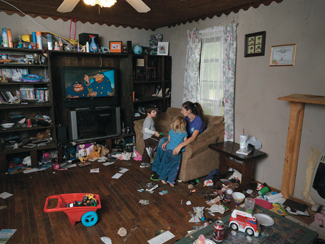
My parents don’t seem to do too much. My mother has to rely upon a motorized wheelchair to move around, and only leaves her home to visit her numerous doctors. My stepfather seems to spend most of his time gardening and driving to and from the grocery store one town over. He appears to have an obsession with canning vegetables — essentially, pickling the various tomatoes and cauliflowers he plucks out of his own garden. For the last 15 years – as long as I have known him — it’s a ritual he’s performed. Eventually, he ran out of places in the trailer to put his jars, so he built a second tool shed to house all of his vegetables.
When I was a kid, I frequently asked him why he hoarded his jarred vegetables.
The response he gave was something along the lines of “because one day, we’re going to need them.” I guess he has always visualized some sort of catastrophe on the horizon — and looking at the influence of the economic downturn on the area, his apocalyptic visions may have proven wholly accurate.
The phone rings off the hook. If it’s not a bill collector – easily identifiable, according to my mother, because of the “800” digits that flash on the caller ID – then it’s a family member going through some sort of crisis. Their mom is sick, their daughter’s boyfriend left her, somebody needs to be bailed out. Good news, I suppose, never trickles out of the phone around these parts.
“I have spent my whole life around these people, and I still don’t understand them,” I think to myself. And it’s not just their decision-making that I find indecipherable, as their accents are so thick as to be unintelligible most of the time. Earlier in the year, I graduated with a bachelor’s degree in communication – a skill set, I drolly note, that seems like it’s going to be challenged quite a bit over the ensuing months.
Many times in college, I wondered what was “wrong” with us country folk. Why were we such backwards people, so incensed by change and hesitant to progress alongside the rest of United States culture? Why did we reject technology and contemporary cultural standards, and hold on to our hard-drinking, hard-praying and generally unfulfilling ways of life, when the route to a better life — education and assimilation into modern society –was staring us in the face all the while?
From a human action perspective, the argument resembles the old “which came first, the chicken or the egg” dilemma: Are we poor because we’re stupid, or are we stupid because we’re poor? In college, I read several biological hypotheses on the matter, most notably a book entitled “The Bell Curve,” an incendiary tome penned by two academics in 1994 that caused a firestorm of controversy when it was originally released. The argument in that book, essentially, was two-fold: first, that people are usually poor because they lack intelligence, and much more controversially, that intelligence, for the most part, is an immutable hereditary trait. Of course, many more social variables may explain why poor, rural people have been poor and rural for so long, from institutional “classism” in U.S. society to a “Celtic Southern Thesis” that claims most of rurally impoverished behavior and ideology is a traditional holdover from the days of the Norman Conquest.
And then, it dawns upon me the major error I – and virtually the rest of society – has made when analyzing rural poverty: We’re focusing on excuses, when we should be focusing on the people who actually live there.
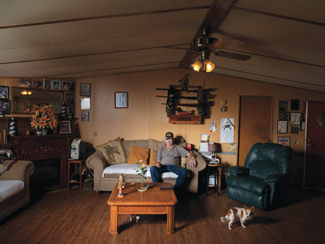
Even as a child, I knew I was so-called “poor white trash.” It wasn’t necessarily because I lived in a trailer, or I wore shoes purchased at the Family Dollar, or even because the other kids at school told me I was. Rather, it just felt like something that was a part of my DNA, like some sort of mutated codon that just made me what I am. Being “poor white trash” had nothing to do with being trashy, or white, or even poor — it was your biological fortune, and there was very little one could do to surmount it.
I grew up poor, but it was a different kind of poor. In the late 1990s, everybody in the neighborhood had jobs, and some of them were even paraprofessionals who earned wages way higher than the national average. My neighbors were nurses and construction workers, licensed technicians and certified mechanics. They may have lived in mobile homes and had crabgrass-choked lawns, but they were making payments on their cars, their electricity was on and they were living lives of, relative, comfort and safety.
But they still had those “poor white trash” tendencies. Most of them drank, and drank heavily. It was around the end of Clinton’s second term that a new menace — crystal meth — managed to sneak its way into the hinterlands, wreaking a substantial amount of havoc for just about everybody. If you didn’t have someone in your family on crank, you knew somebody a few houses over who was. Soon, cars and houses started getting broken into, and what was once a fairly peaceful community turned into a place where everybody was suspicious and paranoid.
But the greatest “poor white trash” tendency of them all, of course, was the mismanagement of money. We had cash coming in, but we had it going out of our wallets just as quickly. Instead of investing in things with long-term potential — college education, property, small businesses and the like — we were investing them in unnecessary things, like cars, big-screen televisions, and lots and lots of alcohol and tobacco. And in the process, we racked up an astronomical amount of credit card debt, setting into motion a series of events that almost drove us into oblivion.
When the housing market collapse and subsequent recession hit northern Bartow County — a fairly small area, about 50 or so miles from Atlanta — it hit hard. At the zenith of the crash, I was attending college, far removed from the rural world I once knew. Even so, while I was researching the works of Kant and Rousseau, I couldn’t help but think about the communities I grew up in, and often wondered just how bad things were up there.
The hamlets and burghs I recall were very much your stereotypical portraits of “small-town America,” with innocuous names like Kingston, Adairsville and Cassville — all quaint, generally quiet communities, the domain of farmers, small retailers and especially textile mill workers. A large percentage of the workforce had jobs in carpet factories in nearby Dalton and Calhoun, two major textile production cities in northern Georgia. And major manufacturing cities they were: According to an Atlanta Journal-Constitution article from earlier this year, more than two-thirds of all carpets manufactured in the United States are produced within 40 miles of Dalton, a city which often boasts of being “the carpet capital of the world.”
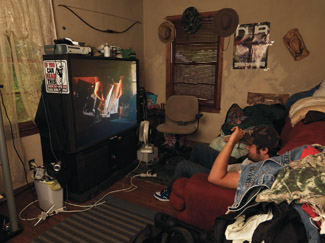
By the mid-2000s, however, the proverbial writing was already on the wall. For years, the humming of construction work was incessant, as the woodlands surrounding our enclave were churned, gutted and sliced to make way for new suburban tract homes. When I first moved to my stepfather’s place in 1997, the area was so sparse and secluded that people literally paid us to go deer hunting in our backyard; by the time 9/11 transpired, only a small stretch of trees and shrubs separated our property from the ever-increasing clutches of suburbia.
As the 2000s continued, the whizzing of the bulldozers and backhoes just stopped. That never-ending hammering eerily faded out, and a familiar, albeit haunting, sound began echoing again. To some, it might have been nothing more than the chirping of crickets, but the cry of the locusts soon indicated that something dire was ahead: a plague of poverty, an economic drought the likes of which the community had never experienced before.
First, one of your friends lost his job. Then, one of your family members lost her home. Then, another story about a lost job, and another one about a lost home. The small businesses — the record stores, the greasy spoons, pretty much all of the mom and pops — disappeared. “For-sale” signs started popping up in front of those freshly constructed tract homes, but nobody was moving in. All of the transplants from Ohio and Illinois and Pennsylvania appeared to have left town as quickly as they came into it. Then you hear about your uncle losing his job, and your best friend tells you that he’s been evicted. You run into one of your old high school chums, and he’s on food stamps. More businesses start laying off workers, and this time, it’s the big ones: the tire plant, the warehouse, and, then, one of the mills. And then, another mill, and another and another. It all happens so quickly, and seemingly without pattern; everyone is on edge, fearful that the next job lost, or the next home foreclosed, or the next car repossessed, will be theirs.
Much like the Black Death that ravaged Europe in the 14th century, the late 2000s recession galloped through the back roads and countryside of my youth, sapping entire cities of their economic livelihood. A litany of demographical changes — from an influx of Hispanic workers and transplant laborers from the Rust Belt to an overall graying of the locale’s scant skilled workers — only exacerbated the hardships. Coupled with a still ongoing methamphetamine crisis — not to mention those old nags, alcoholism and prescription medicine misuse — the repercussions of the economic crisis weren’t just disastrous for my rural kin, they were almost terminal. A plague of an entirely different kind had ravaged the kingdom, this one ushered in on the backs of nonperforming bonds as opposed to diseased rats. Across the land, a Green Death emerged, and not a single household remained unscathed.
At 69 and 60, respectively, my mother and stepfather claim to have lived “through it all.” Both are deemed disabled following major health scares; cancer for my stepfather, and a stroke for my mother, leaving her partially paralyzed. They currently live in a doublewide trailer with a tarp covering the roof. According to my stepfather, they’re “in a lot better shape than some other people” they know. They both consider themselves fortunate to have private insurance. My mother, a former nurse, is particularly outraged by the state of modern healthcare.
“There’s so many people that don’t have any insurance at our age,” she said. “They can’t afford their medicine, and nobody seems to be doing anything about it, trying to change the healthcare system.”
She said she was on disability for more than two years before she was eventually cleared for Medicare. “From the bills I’ve got right now, if I had to pay out of pocket,” she tells me, “it would probably be over $300,000.”
Like many people in the area, my stepfather says he has no idea what “caused” the recession. “They say President Obama inherited most of it,” he said. “He may have inherited some of it, but he’s caused a whole lot more.”
Oddly, his umbrage sounds remarkably similar to the complaints of the Occupy Wall Street crowd. “You bail out all of those automotive factories and all, and this is stuff a taxpayer has got to pay off,” he said. “All these people that was bailed out on Wall Street, [they] turn around and give their employees a big bonus, out of our money?”
His grey eyes look like they’re swelling up a tad. “That’s just not right,” he tells me.
I ask my stepfather — a Vietnam veteran who grew up as a sharecropper in the fields of south Georgia — what he considered “poor” to entail. His response was a strangely philosophical one. “We was so weak, we couldn’t hardly load the furniture to move,” he tells me. “That’s poor.”
My mother tells me, these days, she’s just living one day at a time. She rarely, if ever, moves from the recliner in the living room, where she’s connected to several oxygen tanks.
“Our biggest struggle is trying to manage and take care of what little money we do have, and hope and pray things don’t get worse than they already are,” she said.
I ask her what gives her hope nowadays. She tells me she believes in prayer, and begins describing her hypothetical political savior.
“We need somebody to run this government that knows what they’re doing and that can fix it,” she said. “We need somebody that’s got different ideas.”
Neither my mother or stepfather believe their economic hardships are going to conclude anytime soon.
“I think it’s going to get worse before it gets better,” my stepfather said. “I hope that I’m wrong, but I just don’t see it turning around anytime soon.”
My mother says she sees it getting worse everyday. “It’s not just the United States, it’s the whole world that’s in trouble,” she tells me. “Every country is in debt, and fighting, and [making] nuclear bombs.”
She pauses for a moment, lightly twisting the plastic nasal cannulae above her mouth. “I just don’t see it getting any better,” she concludes.
Their image of modernity almost seems to be the inversion of the “21st century” world I was told about in college. For the last four years, my professors spoke about how globalization and technological advancement was going to forge a new, multicultural civilization that revolutionized the way we view humanity. Diseases were going to get cured, hunger was going to be eradicated, and interplanetary travel was going to become a reality before I died. When I thought of the future, I thought of the grand, the fantastical and the mesmerizing.
But when my family thinks of the same thing, they see nothing at all. Their culture doesn’t envision a negative utopia, they don’t envision any sort of future at all. The recession hasn’t just killed their optimism, it seems to have killed the very forward movement of time itself.
They’re just stuck there, in their little mobile home, with a flat screen television, two broken toilets and black mold growing on the ceiling. Essentially, they’re trapped, unable to move out of the world created by 2008. For the rural poor, the years since the Great Recession have been a five-year stint in purgatory, with the scent of a Green Death wafting overhead at all times.
Photo credit: All photos byJan Banning
James Swift is a Georgia writer whose work covers an array of contemporary social and political issues, primarily involving juvenile justice and other systemic issues facing young Americans. He has reported on the U.S. education system, autism spectrum disorder research, gay and lesbian rights and other cultural issues and events. His work has won awards from the Georgia College Press Association and the Southern Regional Press Institute.
Jan Banning was born from Dutch East Indies parents and studied social and economic history, both of which had a strong influence on his photographic works. His work always has a social focus. The social political environment is put at the fore and it often concerns subjects that have been neglected within the arts and are difficult to portray: state power, consequences of war, justice and injustice. Sometimes the work is the result of a sociological or anthropological classifying approach, such as ‘Bureaucratics’, a comparative study of the world of government officials.


